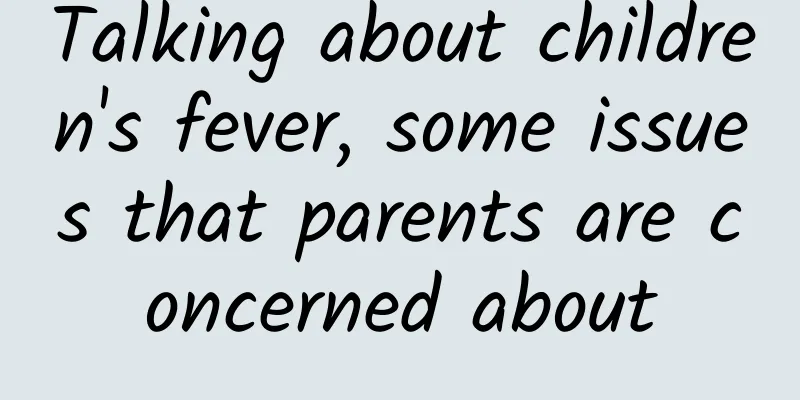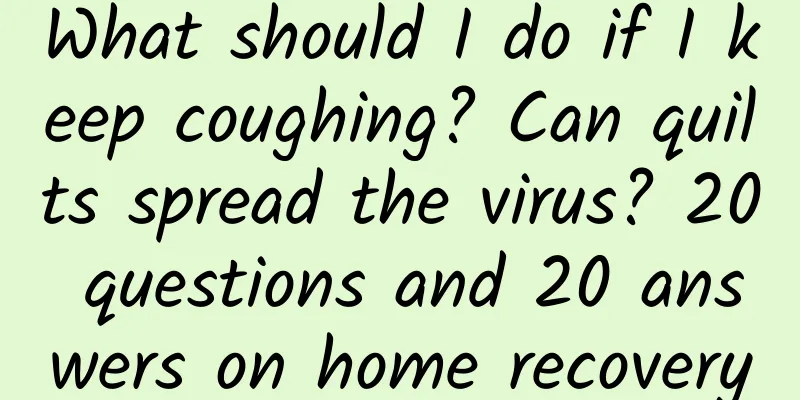Talking about children's fever, some issues that parents are concerned about

|
Author: Liu Quanhua Xinhua Hospital Affiliated to Shanghai Jiaotong University School of Medicine Reviewer: Huali, deputy chief physician of Xinhua Hospital affiliated to Shanghai Jiaotong University School of Medicine Fever is a common symptom in children. Today we will talk to parents about fever in children in the form of questions and answers. The fever mentioned here refers to common acute fever (fever duration ≤ 1 week), excluding long-term fever and fever to be investigated (fever duration of more than 1 week or longer). How to tell if your child has a fever? Fever refers to rectal temperature > 37.8℃ and axillary temperature > 37.3℃. If the temperatures at the above two locations are inconsistent, the rectal temperature shall prevail. Ear temperature is equivalent to core temperature and is close to rectal temperature. Forehead temperature is more easily affected by the external environment, so the forehead temperature is only used as a reference. Normal body temperature , children's rectal temperature fluctuates between 36.9~37.5℃, sublingual temperature is 0.3~0.5℃ lower than rectal temperature, and axillary temperature is 36~37℃. Body temperature varies from person to person and fluctuates within a day, but the fluctuation does not exceed 1℃. The body temperature is low in the early morning, slightly higher in the afternoon, and slightly higher in summer. After meals, after exercise, crying, wearing more clothes, high room temperature and emotional fluctuations can all cause the body temperature to be slightly higher. Therefore, body temperature should be measured in a quiet state. At present, it is recommended to measure axillary temperature and ear temperature, which can be measured with electronic thermometers and infrared thermometers. Figure 1 Copyright image, no permission to reprint Do I need to go to the hospital immediately if I have a fever? It is not necessary to go to the hospital immediately when a fever occurs. First measure the temperature and assess the child's overall condition. When the temperature drops, if the mental state is not much different from usual, and there are no other obvious symptoms, such as continuous crying or irritability, shortness of breath or mental depression, it is recommended to observe at home for 2 to 3 days. During the fever, focus on observing the changes in the child's overall condition. If new symptoms such as coughing, vomiting, rash or worsening mental state appear, it indicates that the condition has changed and you need to be alert. Generally, you need to go to the hospital as soon as possible. How to choose antipyretic medicine for children when they have a fever? **Recommended drugs: **The World Health Organization recommends acetaminophen and ibuprofen because these two drugs have fewer adverse reactions. **Drugs not recommended: **Aspirin, lysine, nimesulide and metamizole are not recommended because of their severe adverse reactions; conventional use of hormones to reduce fever, such as dexamethasone, is also not recommended because it may mask the condition or cause the spread of infectious inflammation. The purpose of reducing fever is to relieve the discomfort caused by the child’s high body temperature, not because the high body temperature will damage the brain and lungs (this situation does not exist). **When to use antipyretics: **When the axillary temperature of children aged ≥2 months is ≥38.2℃, or when they are obviously unwell. For older children, when they have a fever, if they are in good spirits and have no discomfort, they can choose not to use antipyretics even if their temperature is over 39°. If they are in poor spirits and have obvious discomfort, they can use antipyretics even if their temperature is around 38℃. **Antipyretic dosage form: **Oral dosage form is preferred. If it is not an antipyretic suppository, anal administration is not recommended unless the child is vomiting or cannot take the medicine orally. Can two antipyretic drugs be taken alternately? **Not recommended. **Currently, it is not recommended to take two antipyretics alternately. Although taking two antipyretics alternately may have a better antipyretic effect than taking a single antipyretic, the clinical benefit is minimal. The most important thing is that taking two antipyretics alternately can easily lead to overdose of antipyretics and increase the occurrence of adverse reactions. Clinically, some compound cold medicines also contain antipyretics, such as children's acetaminophen granules and acetaminophen pseudoephedrine, which contain acetaminophen, and compound zinc cloth granules contain ibuprofen. Parents should pay attention when using them. How to perform physical cooling? Physical cooling is not recommended. Physical cooling includes alcohol rub baths (not recommended for a long time), cooling patches and warm water rub baths. These methods often cannot increase the comfort of children and are easy to irritate the skin, causing discomfort to children. Therefore, physical cooling is not recommended at present. In some cases, if physical cooling can increase the comfort of children, appropriate physical cooling can be performed. The principle is to reduce heat with cold and reduce cold with temperature. That is, if the hands and feet are hot at the same time as high fever, ice packs can be placed on large blood vessels such as the armpits and groin for cold compresses. When high fever is accompanied by cold hands and feet, chills or shivering, you can wipe your hands and feet with warm water or soak your feet, or take a bath in warm water 1~2℃° higher than body temperature for about 15 minutes. If the fever does not subside, is it necessary to receive intravenous drip or antibiotics? The answer is definitely no! Whether to infuse or use antibiotics depends on the nature and degree of inflammation, the severity of the disease and the overall condition of the child. Anti-inflammatory drugs, commonly known as antibiotics, are for bacterial infections and are ineffective against simple viral infections. Children's fever is mostly caused by viral infections. Viral fever is generally a self-limiting process. When the process ends, the body temperature will usually stabilize. For example, common viral colds usually have a fever for about 3 days, roseola infantum usually has a high fever for about 3 days, and influenza usually has a high fever for about 1 week. Whether to infuse or use anti-inflammatory drugs, you should follow the professional advice of your doctor! When the test results or clinical symptoms indicate bacterial infection, you need to consider using antibiotics. If the inflammation is severe or there is vomiting and you cannot take oral medication, or there are symptoms of dehydration such as less urination, you need to consider infusion therapy. Will persistent high fever burn the brain and lungs? The answer is definitely no! Fever is a defensive reaction of the body to protect itself. Fever will enhance the activity of the body's immune cells and immune molecules, which is conducive to killing pathogens such as viruses or bacteria that enter the body. It can also inhibit the reproduction of pathogens and reduce their damage to the body. What many parents are most worried about is whether the continued high fever will burn the brain and lungs. We can tell parents with certainty that even if the body temperature is around 40°, it will not burn the brain and lungs. Whether fever affects the brain and lungs depends on the severity of the disease and whether there are underlying brain diseases. If the disease progresses to the brain or lungs, that is, encephalitis or severe pneumonia occurs, or if there are underlying brain diseases, such as uncontrolled epilepsy or mitochondrial encephalopathy (which are prone to worsen or progress during fever), it may affect the brain and lungs. Whether there is encephalitis or pneumonia requires a doctor's assessment. If there is only fever, other symptoms are mild, and the mental state is not much different from usual, then the possibility of pneumonia and encephalitis is small. If the body temperature is high when sleeping, do I need to wake him up and give him antipyretics? Not recommended. Simple fever will not burn important organs such as the brain and lungs. Moreover, sleep is conducive to recovery from illness. Therefore, if the child is sleeping soundly and has a high temperature, it is not recommended to wake the child up to give him antipyretics unless the child wakes up on his own because he is feeling uncomfortable. How to care for a fever at home? When you have a fever, your body surface temperature is high and you lose a lot of water. When you cool down, you sweat. Therefore, during a fever, you need to drink more water or increase the intake of other liquids, such as breast milk, milk, and juice. Fever can cause faster breathing and heartbeat, an increase in basal metabolic rate, and increased body consumption. During a fever, you do not need to avoid foods containing high-quality protein, such as milk and eggs, and you can eat them as usual. Fever can affect the secretion of gastrointestinal digestive enzymes and gastrointestinal motility, so children with fever are prone to poor appetite, and may also experience gastrointestinal symptoms such as abdominal distension, vomiting, and diarrhea. Therefore, try to reduce or avoid raw, cold, greasy, and indigestible foods. When a child has a fever, the clothes or blankets should be appropriate, and avoid too much or too little, especially not too much. When the child has a fever, chills or chills, the hands and feet are often cold. You can cover the child with a blanket or clothes and socks appropriately to increase the child's comfort. When the fever reaches the high fever stage, the chills and chills disappear, and the hands and feet are warm, so you need to cover or wear less. When the child has a fever, you can turn on the air conditioner according to the situation. Figure 2 Copyright image, no permission to reprint |
>>: What will the password of the future look like? Smartphones will become your only key
Recommend
What color is cervicitis bleeding
Important reminder: I believe that everyone has a...
Normal leucorrhea routine test report
Some women went to the hospital for a gynecologic...
Is it normal to have your period 9 days early?
Early menstruation is actually a sign of physical...
Do you need to use antibiotics immediately when you have Mycoplasma pneumoniae infection? Here comes the list of scientific rumors for October →
1. Does Mycoplasma pneumoniae infection require i...
Is urine pregnancy test accurate at night?
If an adult woman has sex without taking any cont...
What are the standards for surgical masks? How to test whether disposable masks are qualified?
The wide variety of disposable masks on the marke...
What foods should not be eaten when having pelvic effusion?
For women, gynecological diseases do not only exi...
Is it normal for a 13 year old girl to have her period?
I believe that there are some things about the de...
How can pregnant women tell if their water has broken?
Pregnant women need special care for their bodies...
What causes headaches in women?
Headaches are something that almost everyone will...
There is a pimple on the vulva which is very painful
In our daily life, we often see patients with ras...
There is a hard lump in the middle of the cleavage
Women must pay more attention to their breast hea...
Is candidal vaginitis contagious?
Candida vaginitis is a type of vaginitis and a di...
What causes cervical erosion?
Cervical erosion is a gynecological disease that ...
Explore strategies for early identification and prevention of diabetic foot
Diabetic foot, as a serious complication of diabe...









